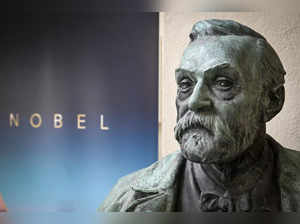 AP
APFirst in line, as is customary, is the Nobel Prize in medicine or physiology, set to be announced by a panel of judges at the Karolinska Institute in the Swedish capital on Monday. Subsequently, the prizes in physics, chemistry, literature, peace, and economics will be disclosed, with one revelation each weekday until October 9.
The Nobel Prizes: A Concept More Potent than Dynamite The Nobel Prizes owe their existence to Alfred Nobel, a 19th-century Swedish businessman and chemist. Nobel, renowned for inventing dynamite, mixed nitroglycerine with a stabilizing compound, propelling the explosive into popularity within construction, mining, and the arms industry. His wealth from this innovation likely spurred his contemplation of legacy. As he neared the end of his life, he decided to allocate his substantial fortune to fund annual awards for those who had significantly benefited humanity.
The inaugural Nobel Prizes were conferred in 1901, five years after Nobel's passing. In 1968, the sixth prize, for economics, was introduced by Sweden's central bank, although purists emphasize that this isn't a true Nobel Prize, it is presented alongside the others.
Peace in Norway Alfred Nobel, for reasons not entirely clear, designated the peace prize to be awarded in Norway, while the remaining prizes are bestowed in Sweden. Speculation suggests Sweden's history of militarism may have influenced this choice. During Nobel's lifetime, Sweden and Norway were in a union, albeit a reluctant one following Sweden's invasion of Norway in 1814. Nobel might have perceived Norway as a more suitable location to encourage "fellowship among nations."
To this day, the Nobel Peace Prize remains entirely Norwegian, with Norwegian committees selecting and announcing the laureates. The peace prize possesses a unique ceremony in Oslo, Norway, on December 10, Nobel's death anniversary, while the other prizes are presented in Stockholm.
What Role Does Politics Play? Nobel Prizes project an image of impartiality, concentrating on humanity's welfare. However, the peace and literature awards, in particular, have faced allegations of politicization. Doubts have arisen regarding whether laureates are chosen for their exceptional work or alignment with the judges' political inclinations.
Notably, President Barack Obama received the peace prize in 2009, less than a year into his presidency, triggering scrutiny. The Norwegian Nobel Committee, while independent, has connections to Norway's political system. Its five members are appointed by the Norwegian Parliament, thereby reflecting the legislature's power balance.
To avert any perception of political influence, individuals from the Norwegian government or Parliament are barred from serving on the committee. Nevertheless, foreign nations have, at times, questioned its independence. When Chinese dissident Liu Xiaobo received the peace prize in 2010, China froze trade talks with Norway, resulting in years of strained relations.
Gold, Glory, and Generosity One factor contributing to the prizes' renown is the substantial cash prize they offer. This year, the Nobel Foundation, responsible for the awards, raised the prize money by 10%, now amounting to 11 million kronor (around $1 million). Laureates also receive an 18-carat gold medal and diploma during the award ceremonies in December.
Most recipients take immense pride in joining the ranks of Nobel laureates, from Albert Einstein to Mother Teresa. However, two notable individuals, French writer Jean-Paul Sartre (1964) and Vietnamese politician Le Duc Tho (intended to share the peace prize with U.S. diplomat Henry Kissinger in 1973), declined their Nobel Prizes. Various others couldn't accept their awards due to imprisonment, such as Belarusian pro-democracy activist Ales Bialiatski, a co-recipient of last year's peace prize with human rights groups in Ukraine and Russia.
Diversity Concerns Historically, Nobel Prize recipients have been predominantly white men. Although this has begun to change, diversity, especially in the scientific categories, remains a concern.
To date, only 60 women have received Nobel Prizes, including just 25 in scientific fields. In physics, only four women have been laureates, and two in economics. Critics now assert that judges must improve at recognizing the achievements of women and scientists from regions outside Europe and North America.
While prize committees contend that their decisions are based on scientific merit, not gender, nationality, or race, they acknowledge the criticism. Five years ago, the head of the Royal Swedish Academy of Sciences disclosed efforts to ensure nominations did not overlook "women or people of other ethnicities or nationalities."
(With inputs from AP)

Read More News on
Download The Economic Times News App to get Daily Market Updates & Live Business News.






 Get Unlimited Access to The Economic Times
Get Unlimited Access to The Economic Times

